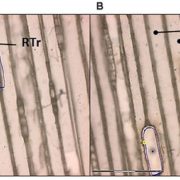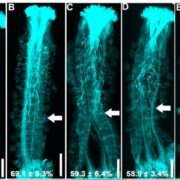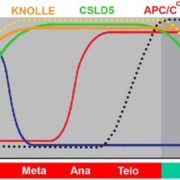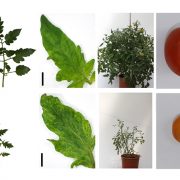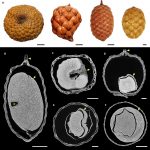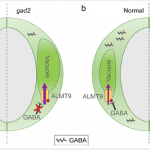Autophagy promotes photomorphogenesis during seedling development (bioRxiv)
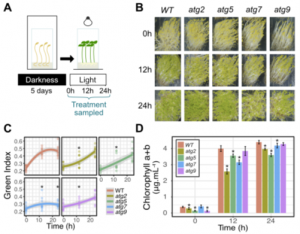 Autophagy is an intracellular evolutionarily conserved catabolic process that degrades cytoplasmic constituents and organelles in lytic vacuoles (micro- and macro-autophagy) or in the cytosol (mega-autophagy). Autophagy can be induced by biotic or abiotic stresses, sugar, carbon and nutrient starvation and also influences various developmental processes. Wijerathna-Yapa et al. investigated the abundance of organelle-specific marker proteins of autophagy mutants in various development transition processes using a targeted proteomics (multiple reaction monitoring, MRM) strategy. They observed atg mutants showed a delayed chloroplast development during dark to light transition. This observation is due to lower photosynthetic and chlorophyll biosynthetic proteins, a reduction in chlorophyll content and size, and also increased abundance of proteins involved in plastid fatty acid biosynthesis. The different abundance of proteins observed in atg mutants are not explained by the differential transcription level. Moreover, the delayed chloroplast development in the atg mutants are neither affected by chloroplast lipid import nor MGDG-DGDG content. The autophagy-related slow-greening observed in the chloroplast development is largely due to a limitation in triglyceride catabolism. This study sheds light on autophagy influences on the rate of etioplast to chloroplast conversion by contributing to lipid turnover and energy production. (Summary by Min May Wong @wongminmay) bioRxiv https:10.1101/2021.03.25.437007
Autophagy is an intracellular evolutionarily conserved catabolic process that degrades cytoplasmic constituents and organelles in lytic vacuoles (micro- and macro-autophagy) or in the cytosol (mega-autophagy). Autophagy can be induced by biotic or abiotic stresses, sugar, carbon and nutrient starvation and also influences various developmental processes. Wijerathna-Yapa et al. investigated the abundance of organelle-specific marker proteins of autophagy mutants in various development transition processes using a targeted proteomics (multiple reaction monitoring, MRM) strategy. They observed atg mutants showed a delayed chloroplast development during dark to light transition. This observation is due to lower photosynthetic and chlorophyll biosynthetic proteins, a reduction in chlorophyll content and size, and also increased abundance of proteins involved in plastid fatty acid biosynthesis. The different abundance of proteins observed in atg mutants are not explained by the differential transcription level. Moreover, the delayed chloroplast development in the atg mutants are neither affected by chloroplast lipid import nor MGDG-DGDG content. The autophagy-related slow-greening observed in the chloroplast development is largely due to a limitation in triglyceride catabolism. This study sheds light on autophagy influences on the rate of etioplast to chloroplast conversion by contributing to lipid turnover and energy production. (Summary by Min May Wong @wongminmay) bioRxiv https:10.1101/2021.03.25.437007


